There are certain
songs that feel like they were born as classics: the world knew and
loved them from their release date. Immediate standards like
"Something," "Bridge Over Troubled Water," "My Girl" and "Imagine" were
fully formed in the pop culture firmament from the very start.
Leonard Cohen's "Hallelujah" took a much rockier road to become a musical masterpiece.
The song was a pretty unnoticed album track on Leonard Cohen's 1984
Various Positions record – the one album in Cohen's forty-some year
career that was rejected by his long-time record label Columbia. The
song troubled Cohen so greatly that he wrote 80 verses trying to
get it right and continued experimenting with it in concert for decades after
it was recorded.
It took twenty years
and an eventual hundreds of cover versions – most vitally the ethereal
cover by the tragically short-lived singer Jeff Buckley – for "Hallelujah" to attain the popular ubiquity that it has achieved in the
past decade or so. From the Olympics to Shrek to American
Idol to concerts for the survivors of the World Trade Center
disaster, Haiti and Hurricane Sandy: when a song is needed to convey a sense of
tragedy, hope or faith, chances are good that "Hallelujah" will be
performed.
Many of the biggest
names in music – including Bono, Bob Dylan, Justin Timberlake,
Neil Diamond and Jon Bon Jovi –
have taken a stab at the song. The song is so malleable that acts from
most styles and genres can feel equally comfortable within the gorgeous
melody and poetic lyrics. The fact that there is a long-standing
tradition that verses can be swapped out, moved or even ignored has
created a pop masterpiece that literally can be all things to all
people.
Longtime music
journalist Alan Light (The New York Times, Rolling Stone, Spin)
was fascinated by the unusual journey in which the song has ingratiated
itself into so many hearts. In his fascinating new book The
Holy or the Broken – Leonard Cohen, Jeff Buckley & the Unlikely Ascent
of "Hallelujah" (Atria Books), Light takes a detailed look at the
strange and troubled road that led to this iconic pop culture treasure.
Soon after the book's
release, Light gave us a call to discuss his book and the cult of
"Hallelujah."
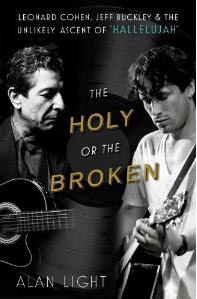 So
why "Hallelujah?" What is it about that song that you feel has captured
people?
So
why "Hallelujah?" What is it about that song that you feel has captured
people?
There's not
one easy answer to why the song resonates. It reaches some very basic
and very universal emotions. First of all, when you're dealing
with something like a Leonard Cohen song, it's very easy to get caught
up in the poetry and the lyrics and the intricacy of the imagery – all
of which are very significant to the impact and the longevity of
the song. But I think people respond to songs first for melodies, moods
and feelings. The elemental, irresistible and very singable melody
at the heart of this song is something that we've seen everybody from opera
singers to Willie Nelson can sing convincingly, whatever your range.
Then also, the feeling and the universality of this word "Hallelujah"
and this idea that goes with it. It's the kind of spirituality that
people are hungry for, are trying to find in the world. Especially as
they go outside of more organized religion, when they find an
experience it feels significant for them like this. That idea of "Hallelujah," giving praise and thanks and finding that kind of spirit
and survival at difficult times. A friend, the cantor at a synagogue in
New Jersey, in the book she says early in her career somebody told her
that if you are singing in interfaith settings or you are singing
outside of your synagogue, any song with "Hallelujah"
in it always
works. That's an idea that cuts across different faiths, different
beliefs, whatever. Everybody kind of gets that. So, I think it's first
of all those things and then over time [it became] the litmus of the
language and the multiple meanings that the song can be imbued with.
Unlike an
overnight smash like, say, "Yesterday," "Hallelujah"Ā¯ had a fascinating
progression, starting out completely obscure and then slowly but surely
engraining itself into the public conscious. How important do you think
it is that the song had sort of a slow burn?
First of all, it was
that trajectory that made me interested in exploring the song. I cannot
think of another song that had a comparable experience. Anything that's
up in that altitude, songs like "Bridge Over Troubled Water" or
"Imagine," people got right away that those were important songs. They
were big hits. Obviously, their meaning changed over time, but there
was this huge splash and then everybody was aware of them.
"Hallelujah," when Leonard turned
in the album the song was on, his label rejected it. Columbia didn't
put the album out. Then when it came out on an indie label a little
later, nobody noticed the song. The review in Rolling Stone was
a nice review, but it didn't mention "Hallelujah." So this song starts
not just under the radar, but way off the radar. (laughs) No
one knew it was there. As you said, it's the fact that it [appeared]
slowly but surely. It was never a hit. It
was never one thing where everybody discovers this song. It was a
gradual build of momentum that kind of snowballed, in fact, from
different covers and different versions and different uses. What it
meant was even still you were in kind of a secret club when you know
about this song. Even though it's become one of the best-known songs in
the world, it still feels like a secret that you've been let in on, that
you've discovered. This is not some big pop song that everybody knows,
even if it is a big pop song that everybody knows. Retaining that
feeling certainly has been important to the longevity of this
experience.
As a writer, how
daunting was it to take on the idea of doing an entire book about a
single song?
What was fun about it
was that I wasn't fully convinced at any stage that it was going to
work. I had this idea that obviously something really fascinating had
gone on with this song and maybe that was worth spending some time
with. Writing the book proposal was really an exercise in like: Okay,
does it seem like there is really enough going on here? What was great
was that around every corner was more. The story got richer and
richer. You see how this version leads to that version. What was
really striking was that everybody who has sung this song has ideas
about it. You expect that Bono, or k.d. lang, or some of these people
will have profound things to say about a song, but you don't necessarily
think that the American Idol contestants or Jon Bon Jovi or some
of the people that you might think: "Eh, my manager told me to sing the
song, so I sang the song." What I really found was that nobody sings
this song blindly. They are all very aware of what it means and how
important it is. The kind of legacy that you are a part of when you are
singing this. They don't all have amazing thoughts about it, but they
certainly all thought about it. So, it just kept opening up in more and
more directions until it felt like there was enough to sustain a full
book around it.
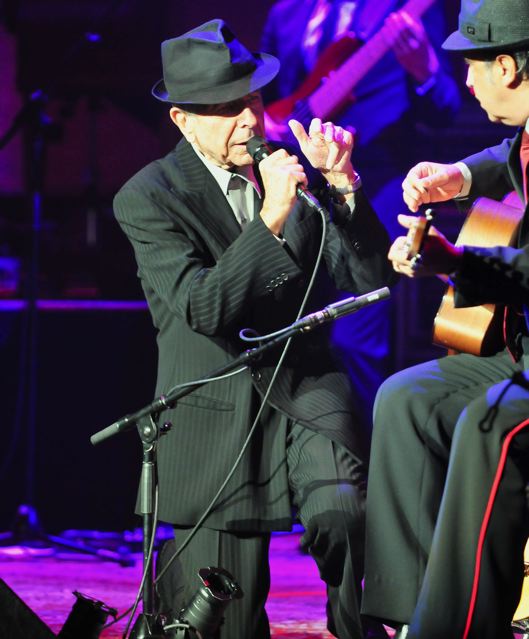 Leonard
Cohen only does very limited interviews and of course Jeff Buckley is no
longer around. Did the inability to talk with them make the writing of
the book harder?
Leonard
Cohen only does very limited interviews and of course Jeff Buckley is no
longer around. Did the inability to talk with them make the writing of
the book harder?
No. I had no
expectations that Leonard was going to talk about it. Like you said, he
hardly does any interviews, and also I understand: What does he have to
gain with this song, with all of the aura around it, when tells me I
thought of that line when I was brushing my teeth? (laughs)
What does that contribute to the legacy of the song? So, I really went
to him just asking for his blessing and his approval and that I could
tell people that he was cool with the fact that I was doing this. And,
honestly, there's a couple of stories over the years that he's told
about the song and I feel like that's what he has to say about it. If I
don't get those stories brand new from him but have them, they are
there. They are out there and those can represent that idea. In a way,
the benefit of that was that the book could have gotten too top-heavy as
a Leonard and Jeff co-biography or something. Knowing that I really
wanted it to be the story of the song, I didn't want to spend too much
time with those two guys. You want to tell the story and set it up, and
obviously present these most pivotal versions and how everything else
bounces off of them. In a way, the fact that those had to be a little
more second hand – I talked to the producers of both versions, the
engineers who were around the sessions – but it's not a creation story.
Creation is actually very quiet. The important part is everything that
has happened since. I think in some ways that freed my hands up to feel
like, okay, I can talk about those guys in a finite way and keep things
moving into everything else that has happened.
It seems that John
Cale is sort of the unsung hero to the "Hallelujah" story. Were you
surprised by how important his version of the song ended up in the
song's ascension?
I'm not surprised, in
that I had known his version and known what his was... his re-edit and
rearranging of the song, what that did. I certainly didn't know that it
was actually very directly, that Jeff Buckley learned John Cale's version
of the song. He hadn't heard Leonard Cohen's version when he first
started performing "Hallelujah." Which makes a lot of sense, when you
listen to them. You hear that what John Cale did was strip the song
down musically and emotionally and take it away from this sort of
grander spiritual aspiring of the original recording by Leonard. Do it
just as voice and solo piano. Speed it up a little. Make it feel more
human, more edgy. I think what his edit and then Jeff's version did is
really make it a younger person's song. When Leonard recorded it, he
was 50 years old, he was at a certain point in his career, and it really
has a feeling of looking back on the lessons learned in surviving the
challenges of life. It has that almost elegiac feel to it. Those are
not lyrics that a 24-year-old Jeff Buckley would have been convincing
singing. By doing Cale's version, it's much more present tense. Much
more about learning about heartbreak and pain as it is happening to
you. Seeing what it is that life throws at you and how you have to
press on and survive through that and still hold on to hope and faith,
whatever that means. I think Cale's version obviously is critical to
the direction that the song took. Leonard wrote it to the world.
Leonard wrote it, John Cale edited it, then Buckley was the vehicle to
perform that out to the world.
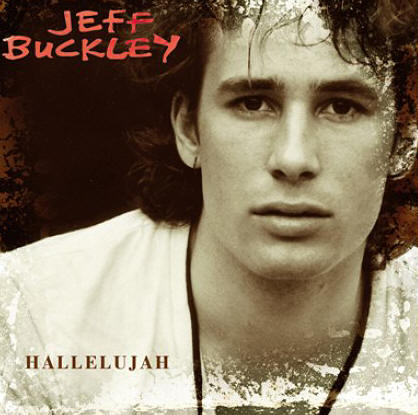 You
say in the book that Leonard Cohen wrote about 80 verses of
"Hallelujah," though basically it seems there are about seven that are
used most often. Were you able to see any of the additional verses when
researching this book?
You
say in the book that Leonard Cohen wrote about 80 verses of
"Hallelujah," though basically it seems there are about seven that are
used most often. Were you able to see any of the additional verses when
researching this book?
I was not. I raised
it at one point, with no expectations. Several
things... The good part of that story is, there is one sort of sub-theme
of this story, that during the first part of the story, the discovery
and popularization of the song around the turn of the century, were the
years when Leonard's manager was stealing all his money and ultimately
disappeared with millions of his dollars and a bunch of his stuff –
including the notebooks that the "Hallelujah" drafts were contained in.
Happily, when she came to trial last year – as a harassment trial – he
got back a lot of his stuff, including the "Hallelujah" notebooks. So
they are back in his possession. But it's obviously a song that is
particularly important to Leonard. He has talked a lot about the
torture that "Hallelujah" caused him and how difficult it was to figure
out what the song was and where to stop. That's not a unique
process for him. Many of his songs go through lots and lots of drafts.
Lots and lots of extra verses and bit parts and things that extend for
years and years. So I think ultimately he has got to decide if that
all goes in a University archives anywhere or if he publishes any of
that remains to be seen, but he did not open the other 70 verses to me.
And, fair enough. Things don't come out for a reason.
Can you think of
any other song where people can just swap in and out or rearrange
different verses or lyrics to suit their own meaning?
It's really
unique. I'm sure that there are, especially if you think about national
anthems or more civic kinds of songs. There are other verses to
"The Star-Spangled Banner." Stuff like that. But it's hard to think of
another pop song where there is permission to alter it in quite the same
way. It certainly has been very much to the song's service that you can
turn up or turn down different elements. You can take what you hear in
"Hallelujah" and make that what your version of the song is. If things
don't seem appropriate to sing in a church service, it's okay to drop
those verses. If you want to concentrate on the romance and heartbreak
side of it, you can dial that part up. You think about "Imagine." I
say in the book, Yoko Ono says she gets requests every week from people
who want to record "Imagine," but they just want to change that one
line. They want to change the "Imagine no religion" line, then they want to
do it. She says, it's not for me to authorize that. It's not for me to
say that you can change meanings that way. That's one line in the
song. With this song, it's been clear for many years to sing whatever
verses you want. Take whichever lines you want. I think it got so
removed from Leonard's original experience that he kind of watches it
like everybody else. Sees where it's going to go. Lets it take its
own life.
I did a biography
of Tom Waits, and at one point Solomon Burke was recording one of his
songs but wanted to change a lyric because it was not religious enough
and his producers were horrified and told him you just don't rewrite Tom
Waits. In the end, Waits okayed it, but Leonard is held in similar
stead as a lyricist, so I find it fascinating that people do change his
song up so easily.
Right. They would be
more protective. But I think, again, it was such a struggle for Leonard
to finalize this song. After it came out, immediately when he was
touring he was changing lyrics and switching up verses. The live
version he put out from recordings that were right after the Various
Positions album came out, different verses in a different order.
Whether it was his disappointment at how little response the song got in
the first place or whether he just wasn't fully satisfied with it yet,
he himself didn't view it as a fixed text at that point. So, I guess at
that point he said, well, let's see what it is that people respond to
and what they want to do with it.
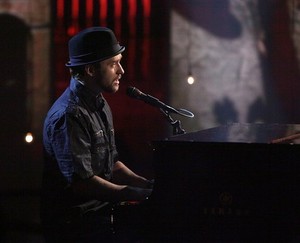 Who
were some of the most important people for you to talk to? Also, were
there people you were surprised to get to discuss "Hallelujah"¯ with you?
Who
were some of the most important people for you to talk to? Also, were
there people you were surprised to get to discuss "Hallelujah"¯ with you?
The things that were
gratifying were first of all how everybody really did want to talk about
it. Justin Timberlake and Bono and Jon Bon Jovi, all the biggest stars
who've done it, all were very open to the idea of talking about this
song and their performance. As I said, everybody across the board had
things to say about it and clearly had thought about the song. That was
great, because you just don't know. What was in some ways even more
gratifying was just talking to regular people about how
they've used it in their lives – in weddings and funerals and religious
services and all of the ways that the song has become so embedded in
people's actual experiences. It's so easy for us to get cynical about
music now and think it's so commoditized and it doesn't mean what it
used to. It's not important the way that it used to be. To hear what
this song means to people and of these pivotal moments that they turn to
it and the reasons that they turn to it, that was a really powerful
thing for me to hear. Music really does still matter in that way. It
really does still play such a crucial role in real life. You sometimes
forget about that these days. (laughs) It was really good to
hear all of that. The important versions... there are
different kinds of importance. Obviously I did want to talk to the
people around Leonard and Jeff's recordings, just to hear about what
those sessions were and how they got the versions that they did. Then
it was important to talk to the director of Shrek, to hear about
how it ended up in, of all unlikely places, an animated kids'
movie. It was important to talk to some of the American Idol and
X Factor contestants, to hear about what it was to have this song
in that context that put it in front of millions and millions more
people. Obviously, again, the people like Bono and Timberlake and
people whose recordings or performances really propelled it to a whole
other kind of audience. To talk to k.d. lang about not just her
recording, but also playing it at the Winter Olympics opening ceremonies
and having it go out to hundreds of millions of people across the world
in a performance like that. Each of those brick by brick were building
what it was that this story is about.
Were there some
other people you would have like to have talked to that you could not
get through to?
The person I really
most wish I could have spoken to was Simon Cowell. (laughs)
Whatever one thinks of him, he put himself out very strongly behind this
song. He's used it multiple times in multiple of his shows, in several
seasons of Idol and of X Factor. For all that you think
about kind of the sideshow with him, I thought here's a chance to
actually talk about music and he might welcome that. But, for whatever
reason, I couldn't get to him. If there is one I most regret in some
ways, it's him, but most of the people I was trying to get to were
really pretty good about it. It takes time getting onto Bono's
schedule, but eventually you get there.
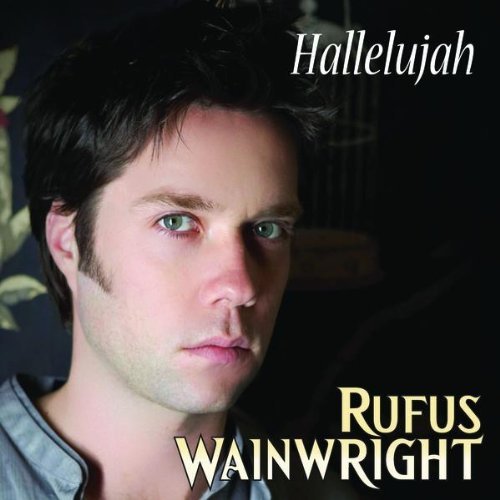 Most
Leonard Cohen fans would be hard pressed to name "Hallelujah" even as
their favorite Cohen song. Do you think it is his best work? What are
some of your other favorite songs?
Most
Leonard Cohen fans would be hard pressed to name "Hallelujah" even as
their favorite Cohen song. Do you think it is his best work? What are
some of your other favorite songs?
Best is a tough
call. I find it interesting that when Rolling Stone had Rufus
Wainwright give his ten favorite Leonard Cohen songs for some special
issue, "Hallelujah" didn't make his top ten. Now, maybe he's just tired
of singing the thing. I don't know. I think a lot of devoted Cohen
fans would probably agree with that. My own favorites? "Tower of Song" is a song that I absolutely love. I think it's a
perfect piece of writing. "Anthem" is a tremendous song. "Bird on a Wire" is a really
good song. But I think when you think of each of those, you may think
of ways they are better in terms of the perfection of the imagery and
the intricacy and the precision. They are remarkable pieces of writing,
but you can also see how those songs are not going to resonate
universally the way that "Hallelujah" does. They don't have quite that
melody, that hook, and again, this kind of general spiritual sense that
the chorus gives you that makes this a different kind of a song. You
understand why it is that this one hits in a way that other stuff that
he's done does not. In some ways, the things that are less imperfect in
the song are things that have ultimately been to its advantage. A
little bit of the ambiguity and the haziness of the lyric and the way
that it shifts perspective and it's not always exactly clear what is
going on in the verses. What we were saying before, I think that allows
for some more interpretation, some more malleability and ability to make
the song mean what you want it to mean, however fair or not fair it is.
It leaves the door open a little bit in a way that not all of his stuff
would do.
What are some of
the best recordings of "Hallelujah?"
It's kind of a punt,
but when asked for my favorite, my answer is always the way that Leonard
sings it now, on the last couple of tours.
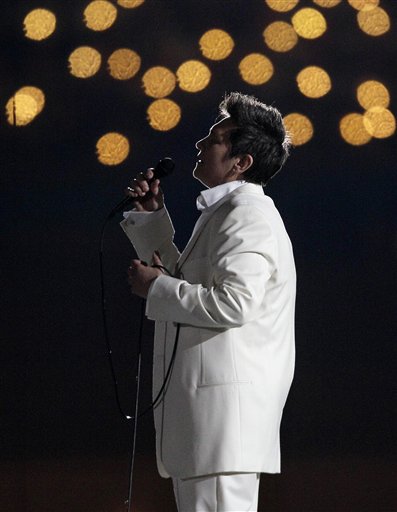 I
agree, I think his Live in London
version may be my favorite.
I
agree, I think his Live in London
version may be my favorite.
Yeah. And the
version from Coachella that is on Songs From the Road. That's a
pretty remarkable version. It distills a lot of what has been
learned about this song over all the years and all the different edits.
How he now puts the verses together. I think there is something very
special in that. k.d. lang does a pretty remarkable version.
Her voice is a pretty powerful match to this song, in a different
kind of an effect than some of the others, it's a really good one. The
other one that was great for me to go back to, maybe because it's just
so easy to get caught up in the words, is an instrumental version by a
ukulele player named Jake Shimabukuro, who is kind of the Jimi Hendrix
of the ukulele. He does it as an instrumental. When I talked to him,
he's like, "This song isn't about the words at all for me. It's about
the feeling of the notes and that melody line." If nothing else, it was
good for me to regularly go back to that as opposed to thinking, well do
they do this verse or that verse? What's the jigsaw puzzle of the
lyrics from this version to that version? Just to hear this is what
this song is, this is what the melody is, this is what it sounds like.
That became a very powerful thing for me to have.
What are some of
the worst?
There's not that
many. I think that as somebody says in the book, if you just stand
there and deliver the song, it doesn't fail very often. (laughs)
Look, I have no issue with the idea of Susan Boyle recording this song,
but I think that the edit that she did for her Christmas record is such
a butchering. It literally cuts off in the middle of a verse. It
doesn't make any sense. (laughs again) That is a difficult one
to get through. It's clear she's just looking for the excuse to get to
the chorus as fast as she can. Sing "Hallelujah" over and over again
and not have to bother with the rest of the song.
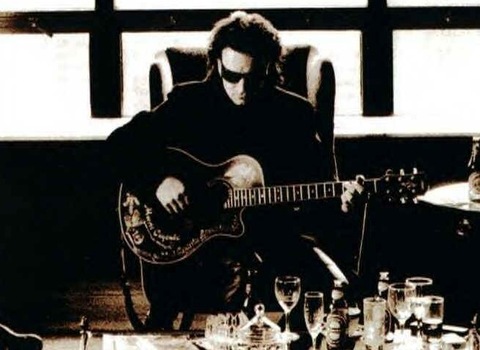 Right.
And it has always sort of amused me that "Hallelujah" has tended to make
it onto holiday albums, because there is nothing the least bit
Christmas-y about it beyond the fact that it has some religious imagery.
Right.
And it has always sort of amused me that "Hallelujah" has tended to make
it onto holiday albums, because there is nothing the least bit
Christmas-y about it beyond the fact that it has some religious imagery.
No. But that's
enough [for some people]. That feeling that it can be seasonal or
whatever. So that one. The other one that is funny to talk about is
Bono's recording. When he did it as a solo recording on a Leonard
tribute record [Tower of Song] in the 90s, he did this sort of
trip hop electronic version where he whispers the lyrics and sings this
falsetto chorus. It's just a train wreck. It's always such an
incredible disappointment from someone you think more than anybody could
get inside a song like this. It's just a mess. So I talked to him,
after some time to chase him down. It really was very funny, because he
got on the phone and said, "Hi Alan, it's Bono. I couldn't remember why
I agreed to do this interview. Then I remembered it's because I have to
apologize to everybody." (laughs) He proceeded to say,
"I know that version that I did is just terrible. I know what I
was trying to do. I know what the experiment was, but I never
should have put it out. This song is so important to me and I just
kind of botched my chance at it." I was relieved, because I had been writing about how bad
his version was and thought, oh, well, if he gives me some great defense
of it I'm going to have to rework that entire section. Instantly he
copped to why it just didn't work at all and how embarrassed he was
about that. But he's made his peace with it. U2 were treating
"Hallelujah" as part of the encore on the last two tours that they did,
so I guess he's gotten over that experience and he can get up there and
do it again.
As you mentioned
in the book, a tiny bit of "Hallelujah" backlash has set in, now that
it's been on American Idol and even Adam Sandler just parodied
it. Do you think the song will settle in now, or do you think it will
continue to grow to become even more of a standard?
The Sandler thing was
funny, because I say in the book that I'm waiting for somebody to do the
parody. It was sort of past time, given how long this song has been
taken so seriously and so solemnly. I was waiting for Weird Al [Yankovic]
or putting it in a Judd Apatow movie or, I don't know, something to pop
the bubble a little bit. The week after my book comes out, Adam Sandler
gets up at this Hurricane [Sandy] Benefit and does his parody version,
which on the one hand vindicated me and on the other hand made my book
out of date instantly. But I laughed at what he did with it. It's a
tribute to... you know, you have to be confident that everybody knows a
song if you're going to get up and make fun of it in a setting that goes
out to that many people. It's funny, people heard it and it was, okay,
now maybe people are going to back off. They'll give the song a rest
for a little while. But two days after that horribly were the shootings
in Newtown [CT] and instantly, when people needed that emotion or
something to do that work again, "Hallelujah"¯ was at the memorials for a
bunch of kids. The opening of The Voice the next week the judges
and the contestants all sang "Hallelujah" holding the names and ages of
the victims on cards in front of them. It wasn't even 48 hours after Sandler's thing and the song was right back in that kind of use again.
So, I don't think it's over. I think that maybe there is a finite life
cycle in some ways. I talked to Paul Simon and he said he never
expected that "Bridge Over Troubled Water" was going to become what it
became, but he watched it turn into that kind of a song that is always
there and always around. Then he watched "Hallelujah" come up and be
the next song that did that. It's tough to say that somebody else won't
write a song that connects in a similar way and become the go-to for a
while. But I think until then, this is going to stick around for now.